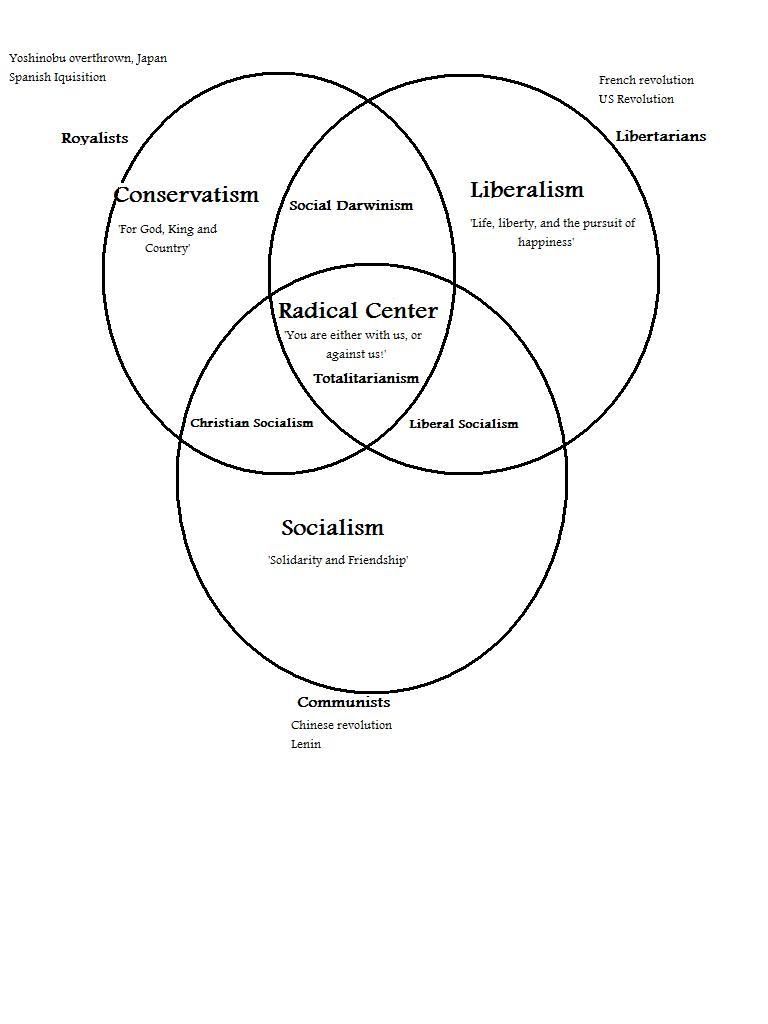
Here is a project we have been thinking about, it is a work in progress, trying to get a map of political ideas.
*Democracy works everyplace on this circle except the outside borders. Extremity in any disallows citizen participation, as does the centre, when the right to vote is restricted.
*On Civil Liberties- ‘All men are created equal.’ is an accepted premise among all on this circle except the centre and pure conservatives, where some people are more deserving than others.
*On Economy- Capitalism flourishes everyplace on the circle except the center and pure socialists, the centre choosing to subsidize agriculture and industry over individuals
*On Strong Government- Strong government influence is accepted in all areas of the circle except the centre and pure Liberalism, people who proclaim to be anti-government but organize into political parties and effect government making policies are exception, a common occurrence in the middle
Radical Center politics has no clear agenda or direction and thrives over one party issues and black-white division. It is very hard to see because it borrows from all political ideals. Imagine this diagram as a race track, and the goals and ideals of the people should be pursued, meaning confrontations should happen. Solutions should be taken in a direction that meets the needs of the people. Extremism in any one direction is unstable, resulting in revolution, and sinking in the middle means nothing gets done.
From Wikipedia, 'Various groups have adopted 'radial center' as a term to describe a third way philosophy which includes their belief that, in affirming the core principles involved on both sides of a dilemma, the dilemma or disagreement can be rendered moot.'
Popularism is another word for the radical middle because they find it easy to get votes, everyone can see some element of their beliefs in the party. Lets take an infamous example, national socialists (Nazis) They pushed for workers rights which no conservative would touch, then espoused a survival of the fittest ideal that scared off socialists. They supported for a strong government that horrified liberals. Simultaneously, National Socialists appealed to conservatives’ appreciation of heritage and history, with strong religious or moral values, Government ownership of industry appealed to socialists and appeal to liberals’ desire to influence government policies, seeming to apply more government control to industry (corporatism) than individuals.
Despite the claim to these values by National Socialists, all of it is rendered moot. Only the value that is needed at the time to stay in power gets enforced. They orally promoted workers rights, but the shot workers who striked, claimed devout religious values while promoting hate and fear, and claimed less government while increasing spending and monitoring of citizens.
*On Civil Liberties- ‘All men are created equal.’ is an accepted premise among all on this circle except the centre and pure conservatives, where some people are more deserving than others.
*On Economy- Capitalism flourishes everyplace on the circle except the center and pure socialists, the centre choosing to subsidize agriculture and industry over individuals
*On Strong Government- Strong government influence is accepted in all areas of the circle except the centre and pure Liberalism, people who proclaim to be anti-government but organize into political parties and effect government making policies are exception, a common occurrence in the middle
Radical Center politics has no clear agenda or direction and thrives over one party issues and black-white division. It is very hard to see because it borrows from all political ideals. Imagine this diagram as a race track, and the goals and ideals of the people should be pursued, meaning confrontations should happen. Solutions should be taken in a direction that meets the needs of the people. Extremism in any one direction is unstable, resulting in revolution, and sinking in the middle means nothing gets done.
From Wikipedia, 'Various groups have adopted 'radial center' as a term to describe a third way philosophy which includes their belief that, in affirming the core principles involved on both sides of a dilemma, the dilemma or disagreement can be rendered moot.'
Popularism is another word for the radical middle because they find it easy to get votes, everyone can see some element of their beliefs in the party. Lets take an infamous example, national socialists (Nazis) They pushed for workers rights which no conservative would touch, then espoused a survival of the fittest ideal that scared off socialists. They supported for a strong government that horrified liberals. Simultaneously, National Socialists appealed to conservatives’ appreciation of heritage and history, with strong religious or moral values, Government ownership of industry appealed to socialists and appeal to liberals’ desire to influence government policies, seeming to apply more government control to industry (corporatism) than individuals.
Despite the claim to these values by National Socialists, all of it is rendered moot. Only the value that is needed at the time to stay in power gets enforced. They orally promoted workers rights, but the shot workers who striked, claimed devout religious values while promoting hate and fear, and claimed less government while increasing spending and monitoring of citizens.

No comments:
Post a Comment